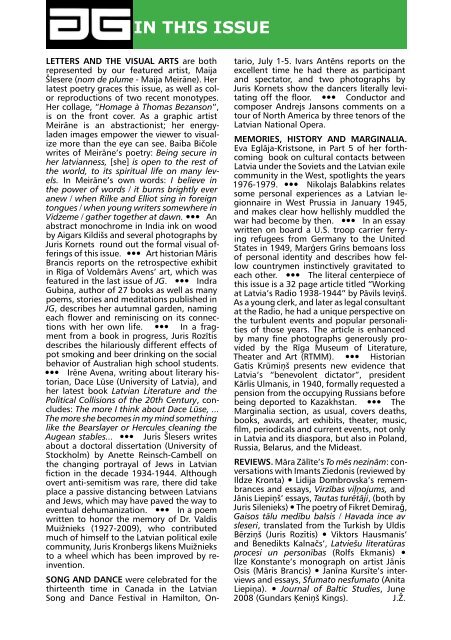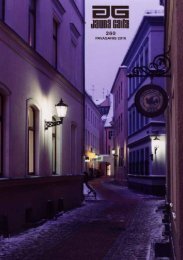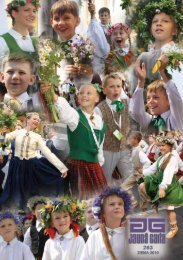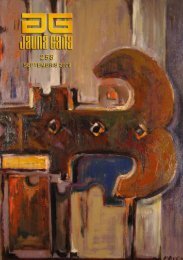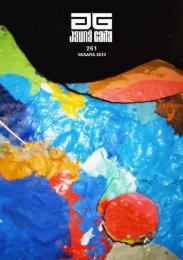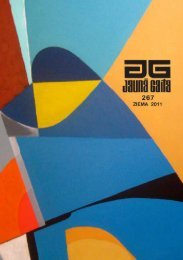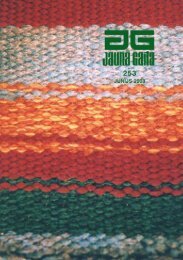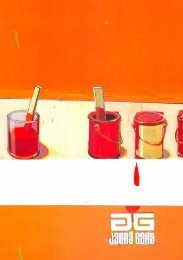lasÄ«tÄju vÄstules - Jura ŽagariÅa mÄjas lapas
lasÄ«tÄju vÄstules - Jura ŽagariÅa mÄjas lapas
lasÄ«tÄju vÄstules - Jura ŽagariÅa mÄjas lapas
Create successful ePaper yourself
Turn your PDF publications into a flip-book with our unique Google optimized e-Paper software.
IN THIS ISSUE<br />
LETTERS AND THE VISUAL ARTS are both<br />
represented by our featured artist, Maija<br />
Šlesere (nom de plume - Maija Meirāne). Her<br />
latest poetry graces this issue, as well as color<br />
reproductions of two recent monotypes.<br />
Her collage, “Homage à Thomas Bezanson”,<br />
is on the front cover. As a graphic artist<br />
Meirāne is an abstractionist; her energyladen<br />
images empower the viewer to visualize<br />
more than the eye can see. Baiba Bičole<br />
writes of Meirāne’s poetry: Being secure in<br />
her latvianness, [she] is open to the rest of<br />
the world, to its spiritual life on many levels.<br />
In Meirāne’s own words: I believe in<br />
the power of words / it burns brightly ever<br />
anew / when Rilke and Elliot sing in foreign<br />
tongues / when young writers somewhere in<br />
Vidzeme / gather together at dawn. ••• An<br />
abstract monochrome in India ink on wood<br />
by Aigars Kildišs and several photographs by<br />
Juris Kornets round out the formal visual offerings<br />
of this issue. ••• Art historian Māris<br />
Brancis reports on the retrospective exhibit<br />
in Rīga of Voldemārs Avens’ art, which was<br />
featured in the last issue of JG. ••• Indra<br />
Gubiņa, author of 27 books as well as many<br />
poems, stories and meditations published in<br />
JG, describes her autumnal garden, naming<br />
each flower and reminiscing on its connections<br />
with her own life. ••• In a fragment<br />
from a book in progress, Juris Rozītis<br />
describes the hilariously different effects of<br />
pot smoking and beer drinking on the social<br />
behavior of Australian high school students.<br />
••• Irēne Avena, writing about literary historian,<br />
Dace Lūse (University of Latvia), and<br />
her latest book Latvian Literature and the<br />
Political Collisions of the 20th Century, concludes:<br />
The more I think about Dace Lūse, ...<br />
The more she becomes in my mind something<br />
like the Bearslayer or Hercules cleaning the<br />
Augean stables... ••• Juris Šlesers writes<br />
about a doctoral dissertation (University of<br />
Stockholm) by Anette Reinsch-Cambell on<br />
the changing portrayal of Jews in Latvian<br />
fiction in the decade 1934-1944. Although<br />
overt anti-semitism was rare, there did take<br />
place a passive distancing between Latvians<br />
and Jews, which may have paved the way to<br />
eventual dehumanization. ••• In a poem<br />
written to honor the memory of Dr. Valdis<br />
Muižnieks (1927-2009), who contributed<br />
much of himself to the Latvian political exile<br />
community, Juris Kronbergs likens Muižnieks<br />
to a wheel which has been improved by reinvention.<br />
SONG AND DANCE were celebrated for the<br />
thirteenth time in Canada in the Latvian<br />
Song and Dance Festival in Hamilton, Ontario,<br />
July 1-5. Ivars Antēns reports on the<br />
excellent time he had there as participant<br />
and spectator, and two photographs by<br />
Juris Kornets show the dancers literally levitating<br />
off the floor. ••• Conductor and<br />
composer Andrejs Jansons comments on a<br />
tour of North America by three tenors of the<br />
Latvian National Opera.<br />
MEMORIES, HISTORY AND MARGINALIA.<br />
Eva Eglāja-Kristsone, in Part 5 of her forthcoming<br />
book on cultural contacts between<br />
Latvia under the Soviets and the Latvian exile<br />
community in the West, spotlights the years<br />
1976-1979. ••• Nikolajs Balabkins relates<br />
some personal experiences as a Latvian legionnaire<br />
in West Prussia in January 1945,<br />
and makes clear how hellishly muddled the<br />
war had become by then. ••• In an essay<br />
written on board a U.S. troop carrier ferrying<br />
refugees from Germany to the United<br />
States in 1949, Marģers Grīns bemoans loss<br />
of personal identity and describes how fellow<br />
countrymen instinctively gravitated to<br />
each other. ••• The literal centerpiece of<br />
this issue is a 32 page article titled “Working<br />
at Latvia’s Radio 1938-1944” by Pāvils Ieviņš.<br />
As a young clerk, and later as legal consultant<br />
at the Radio, he had a unique perspective on<br />
the turbulent events and popular personalities<br />
of those years. The article is enhanced<br />
by many fine photographs generously provided<br />
by the Rīga Museum of Literature,<br />
Theater and Art (RTMM). ••• Historian<br />
Gatis Krūmiņš presents new evidence that<br />
Latvia’s “benevolent dictator”, president<br />
Kārlis Ulmanis, in 1940, formally requested a<br />
pension from the occupying Russians before<br />
being deported to Kazakhstan. ••• The<br />
Marginalia section, as usual, covers deaths,<br />
books, awards, art exhibits, theater, music,<br />
film, periodicals and current events, not only<br />
in Latvia and its diaspora, but also in Poland,<br />
Russia, Belarus, and the Mideast.<br />
REVIEWS. Māra Zālīte’s To mēs nezinām: conversations<br />
with Imants Ziedonis (reviewed by<br />
Ildze Kronta) • Lidija Dombrovska’s remembrances<br />
and essays, Virzības viļņojums, and<br />
Jānis Liepiņš’ essays, Tautas turētāji, (both by<br />
Juris Silenieks) • The poetry of Fikret Demirağ,<br />
Gaisos tālu medību balsis / Havada ince av<br />
sleseri, translated from the Turkish by Uldis<br />
Bērziņš (Juris Rozītis) • Viktors Hausmanis’<br />
and Benedikts Kalnačs’, Latviešu literatūras<br />
procesi un personības (Rolfs Ekmanis) •<br />
Ilze Konstante’s monograph on artist Jānis<br />
Osis (Māris Brancis) • Janīna Kursīte’s interviews<br />
and essays, Sfumato nesfumato (Anita<br />
Liepiņa). • Journal of Baltic Studies, June<br />
2008 (Gundars Ķeniņš Kings). J.Ž.


